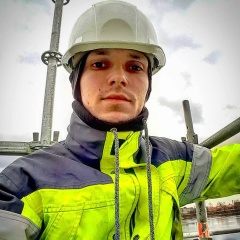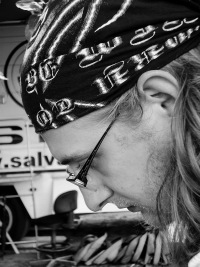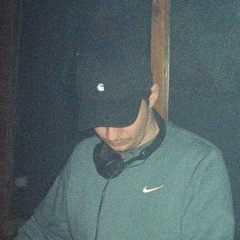"Вначале о такой простоте.
Она для меня сводится к одному слову — сброс.
Я не спрашиваю себя и других, имеет ли место этот самый сброс. Я его вижу воочию и всё тут. Не видел бы я его воочию — может быть, вся моя жизнь выглядела бы иначе. Я занимался бы не тем, чем занимаюсь, я относился бы к происходящему не так, как отношусь. Но я этот самый сброс не просто осознаю, я его именно вижу.
Что я имею в виду под сбросом?
Я имею в виду крах коммунизма как определенной модели восхождения человека. Модели, предполагающей, что человек восходит к новому человеку. И что для этого восхождения нужны определенные социальные, культурные и прочие условия. Они же — коммунистическая мироустроительность, жизнеустроительность, коммунистическая духовность и так далее.
Крах этой коммунистической модели восхождения наложился на предшествующий крах другой сходной модели — общегуманистической. Она же — буржуазно-гуманистическая модель. Она же — крах проекта Модерн.
Этот крах фактически произошел в ходе Первой мировой войны. Но тогда данная модель не рухнула, как дом, полностью потерявший устойчивость и прочность. Почему не рухнула? Потому что ее, что называется, подперла коммунистическая модель.
Именно поэтому все великие гуманисты XX века очень трепетно относились к советскому коммунистическому эксперименту, надеясь, что коммунисты обеспечат некое восхождение человека к тому, что они называют новым человеком, или хотя бы поселят в души отчаявшихся людей надежду на возможность такого восхождения.
Что же касается отчаявшихся людей, то они нуждались в другой модели, и им она была предоставлена. Кем? Гитлером и его оккультными мудрецами. Они предоставили человечеству некую модель нисхождения. Она же — яростный антигуманизм. Она же — метафизика воли к власти. Она же — вечное возвращение Ницше.
Отчаявшиеся люди начали реализовывать эту модель как всемирную и безальтернативную. Они сильно преуспели в этом, но натолкнулись на людей, вдохновленных новой надеждой на восхождение. Человечество отчаяния, вкусившее нацизма как квинтэссенции некоего черного нисхождения, столкнулось с человечеством надежды, оно же — человечество, вдохновленное великим идеалом восхождения к новому человеку.
Человечество отчаяния было временно побеждено человечеством надежды. Эта победа и есть победа советского народа в Великой Отечественной войне. В авангарде человечества надежды стоял именно советский народ. Но он повел за собой очень и очень многих."
Подробнее: https://rossaprimavera.ru/article/1d396dcf
Она для меня сводится к одному слову — сброс.
Я не спрашиваю себя и других, имеет ли место этот самый сброс. Я его вижу воочию и всё тут. Не видел бы я его воочию — может быть, вся моя жизнь выглядела бы иначе. Я занимался бы не тем, чем занимаюсь, я относился бы к происходящему не так, как отношусь. Но я этот самый сброс не просто осознаю, я его именно вижу.
Что я имею в виду под сбросом?
Я имею в виду крах коммунизма как определенной модели восхождения человека. Модели, предполагающей, что человек восходит к новому человеку. И что для этого восхождения нужны определенные социальные, культурные и прочие условия. Они же — коммунистическая мироустроительность, жизнеустроительность, коммунистическая духовность и так далее.
Крах этой коммунистической модели восхождения наложился на предшествующий крах другой сходной модели — общегуманистической. Она же — буржуазно-гуманистическая модель. Она же — крах проекта Модерн.
Этот крах фактически произошел в ходе Первой мировой войны. Но тогда данная модель не рухнула, как дом, полностью потерявший устойчивость и прочность. Почему не рухнула? Потому что ее, что называется, подперла коммунистическая модель.
Именно поэтому все великие гуманисты XX века очень трепетно относились к советскому коммунистическому эксперименту, надеясь, что коммунисты обеспечат некое восхождение человека к тому, что они называют новым человеком, или хотя бы поселят в души отчаявшихся людей надежду на возможность такого восхождения.
Что же касается отчаявшихся людей, то они нуждались в другой модели, и им она была предоставлена. Кем? Гитлером и его оккультными мудрецами. Они предоставили человечеству некую модель нисхождения. Она же — яростный антигуманизм. Она же — метафизика воли к власти. Она же — вечное возвращение Ницше.
Отчаявшиеся люди начали реализовывать эту модель как всемирную и безальтернативную. Они сильно преуспели в этом, но натолкнулись на людей, вдохновленных новой надеждой на восхождение. Человечество отчаяния, вкусившее нацизма как квинтэссенции некоего черного нисхождения, столкнулось с человечеством надежды, оно же — человечество, вдохновленное великим идеалом восхождения к новому человеку.
Человечество отчаяния было временно побеждено человечеством надежды. Эта победа и есть победа советского народа в Великой Отечественной войне. В авангарде человечества надежды стоял именно советский народ. Но он повел за собой очень и очень многих."
Подробнее: https://rossaprimavera.ru/article/1d396dcf
"First, about such simplicity.
For me it boils down to one word - reset.
I do not ask myself and others whether this very reset takes place. I see him with my own eyes and that's it. I would not have seen him with my own eyes - maybe my whole life would have looked different. I would not be doing what I am doing, I would not treat what is happening the way I do. But I am not just aware of this reset, I just see it.
What do I mean by reset?
I mean the collapse of communism as a definite model of the ascent of man. A model that assumes that a person goes back to a new person. And that this ascent requires certain social, cultural and other conditions. They are the same - communist world order, life order, communist spirituality and so on.
The collapse of this communist model of ascension was superimposed on the previous collapse of another similar model - the general humanistic one. She is also a bourgeois-humanistic model. It is also the collapse of the Modern project.
This collapse actually happened during the First World War. But then this model did not collapse like a house that has completely lost its stability and strength. Why didn't it collapse? Because, as they say, it was supported by the communist model.
That is why all the great humanists of the 20th century were very anxious about the Soviet communist experiment, hoping that the communists would provide a certain ascent of a person to what they call a new person, or at least instill in the souls of desperate people the hope of the possibility of such an ascent.
As for the desperate people, they needed a different model, and it was provided to them. By whom? Hitler and his occult sages. They have provided humanity with a model of descent. She is also violent anti-humanism. It is also a metaphysics of the will to power. She is the eternal return of Nietzsche.
Desperate people began to implement this model as global and uncontested. They succeeded greatly in this, but ran into people inspired by a new hope of climbing. The humanity of despair, having tasted Nazism as the quintessence of some black descent, faced the humanity of hope, it is humanity inspired by the great ideal of ascent to a new man.
A humanity of despair has been temporarily defeated by a humanity of hope. This victory is the victory of the Soviet people in the Great Patriotic War. It was the Soviet people who stood at the forefront of humanity's hope. But he led very, very many. "
More details: https://rossaprimavera.ru/article/1d396dcf
For me it boils down to one word - reset.
I do not ask myself and others whether this very reset takes place. I see him with my own eyes and that's it. I would not have seen him with my own eyes - maybe my whole life would have looked different. I would not be doing what I am doing, I would not treat what is happening the way I do. But I am not just aware of this reset, I just see it.
What do I mean by reset?
I mean the collapse of communism as a definite model of the ascent of man. A model that assumes that a person goes back to a new person. And that this ascent requires certain social, cultural and other conditions. They are the same - communist world order, life order, communist spirituality and so on.
The collapse of this communist model of ascension was superimposed on the previous collapse of another similar model - the general humanistic one. She is also a bourgeois-humanistic model. It is also the collapse of the Modern project.
This collapse actually happened during the First World War. But then this model did not collapse like a house that has completely lost its stability and strength. Why didn't it collapse? Because, as they say, it was supported by the communist model.
That is why all the great humanists of the 20th century were very anxious about the Soviet communist experiment, hoping that the communists would provide a certain ascent of a person to what they call a new person, or at least instill in the souls of desperate people the hope of the possibility of such an ascent.
As for the desperate people, they needed a different model, and it was provided to them. By whom? Hitler and his occult sages. They have provided humanity with a model of descent. She is also violent anti-humanism. It is also a metaphysics of the will to power. She is the eternal return of Nietzsche.
Desperate people began to implement this model as global and uncontested. They succeeded greatly in this, but ran into people inspired by a new hope of climbing. The humanity of despair, having tasted Nazism as the quintessence of some black descent, faced the humanity of hope, it is humanity inspired by the great ideal of ascent to a new man.
A humanity of despair has been temporarily defeated by a humanity of hope. This victory is the victory of the Soviet people in the Great Patriotic War. It was the Soviet people who stood at the forefront of humanity's hope. But he led very, very many. "
More details: https://rossaprimavera.ru/article/1d396dcf
У записи 7 лайков,
0 репостов,
354 просмотров.
0 репостов,
354 просмотров.
Эту запись оставил(а) на своей стене Сергей Григорян



























